Intensive pedagogical care and support
Aim
Target group
Objectives
Care and Support
Residental care homes for young adults
One-to-one-support
Supported housing
Aim
Everyone is influenced by their environment. In their home countries, many of the children and young adults who we work with are embedded in a social network that has a negative effect on them and hinders their development. According to Klawe and Berner's theory on social environment, these young people learn to "function" in their particular environment. They adopt behaviour patterns that allow them to hold their own in this environment. For many children and young adults from troubled backgrounds, this means that they adopt forms of behaviour that society considers problematic as their everyday lives have been governed by violence, various forms of abuse or broken relationships from a very early age onwards. These children and young adults cope with their everyday lives by behaving in an oppositional, rebellious, antisocial or aggressive way. In order to change the biographies of children and young adults living in certain situations, it therefore makes sense to break this cycle and to establish some temporal and spatial distance to their social backgrounds. (Berner/Gruhler, 1995, p. 27; Klawe, 2001, p. 63f.)
Target Group
Participation in a programme abroad particularly makes sense for children and young adults who are beyond receiving any form of successful behaviour modification support for those who are about to be sent to live in residential youth care facilities. This is usually preceded by a crisis-type escalation at home or by the fact that these young people can no longer be "managed" in non-secure youth care facilities as they are "refusing to cooperate", "frequently abscond", are "a danger to themselves or others" or "constantly play truant". Often, these are children or young adults who no longer respond to the boundaries set by adults, who are no longer able to comprehend the consequences of non-compliance with these set boundaries or who are totally out of control because they seem to do whatever they want, spend time with dubious "friends" and consume drugs or alcohol. The conceptual and practical basis for the intensive pedagogical programme in Portugal is to get these young people out of their hopeless situation in order to promote a socially acceptable development.
The project is aimed at adolescents aged between 12 and 18; in particular at those who:
- have problems with behaviour social, emotional and mental health difficulties
- have difficulties forming relationships or attachments
- suffer from personality development disorders
- come from abusive or violent backgrounds
- show signs of neglect and display a disregard for rules
- come from multi-problem families
- come from dangerous or dysfunctional social environments
- voice right-wing extremist views and display the respective behaviour
- fail to attend school
- are required to participate in such a project as a condition for the suspension of a juvenile criminal sentence
Criteria for the exclusion of adolescents from this project are:
- a serious substance addiction that affects and controls day-to-day life
- a mental severe disability or multiple disabilities
- psychological disorders that cannot be addressed within the scope of this project
Objectives
Our general objectives are:
- to prevent the young person's situation from becoming worse
- to improve their social, physical and psychological condition and
- to work on their general attitude to life
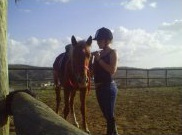
On the basis of the issues affecting the children and young adults described above, the pedagogical and therapeutic work carried out has the following objectives:
- to strengthen and increase feelings of self-worth, self-confidence and self-awareness
- to develop independence of thought, and independent learning, action and working
- to make it possible for these young people to take on the responsibility for their own lives
- to increase their communication skills and to help them to overcome their attachment difficulties
- to establish sustainable relationships (trust, mutual reliance, anxiety reduction)
- to increase their social skills
- to work through and cope with past negative experiences
- to explore new behavioural strategies
- to teach them new conflict management strategies (coping with crises and problems)
- to deal constructively with criticism and praise
- to help them to recognise their own needs, feelings and individual limits
- to increase their self-control
- to show respect and tolerance for other cultures and ways of life
- to achieve a recognised school accreditation and certification
- to provide career guidance
Care and support
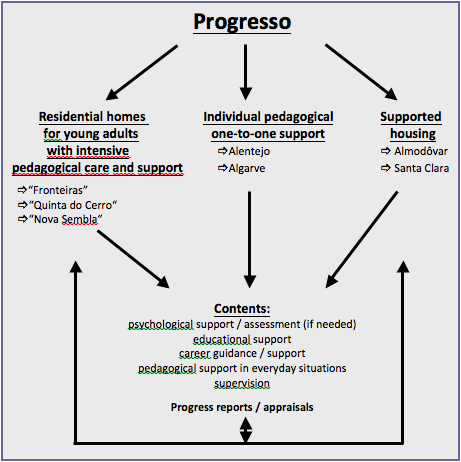
Support phases
Phase 0 – The Preliminary Phase
The initial entry stage must be carefully discussed and prepared beforehand with everyone who is either directly or indirectly involved. We focus on the importance of involving the young person in discussions as much as possible.
If the local youth welfare office makes a respective enquiry, or the supporting German or Dutch organisation recommends that a period of residential care abroad offered by another organisation may be a suitable measure, the project, the extent of the care and support offered and the various options, the admission conditions etc. are presented to the youth welfare office responsible for this purpose.
It is important that the respective funding organisation supplies a member of the pedagogical staff with details of the type of [challenging] behaviour the adolescent has previously shown (personality traits, family background, social contexts, biographical specifics, etc.) beforehand. With the aid of existing files and discussions with the youth welfare office and the family system, Progresso then familiarises itself with the circumstances that may have led to the challenging behaviour. We explore the child or young adult's environment and social background. An assessment of whether the form of support offered in Portugal is suitable for this particular child or young adult is then made on the basis of this.
To allow the child or young adult to mentally prepare for participation in the measure, they are usually shown pictures or videos about the project by a member of the organisation's staff in the course of a first meeting. The child or young adult is invited to ask quations.
Once the youth welfare office, the funding welfare organisation, Progresso, the young person concerned and their legal guardian(s) agree to the measure, a team around the child meeting attended by everyone involved is set up in order to develop and formulate some initial educational objectives. Important organisational arrangements (vaccinations, medicines, insurances, legal guardian permissions, expert opinions;by a doctor and a psychologist, removal from school – including the permission to suspend compulsory education or to change the location of this education – the conditions for return in the event of early termination of the measure etc.) are discussed.
If family therapy is considered a sensible measure, further meetings between the family and the supporting organisation staff will be held at a later stage.
Before the young person can leave for Portugal, the Portuguese central office must approve their stay.
Once all applications have been approved by the respective authorities and all of the preliminary arrangements have been completed, the child or young adult flies to Portugal, usually accompanied by one of the project workers.
Phase 1 – Acceptance and recognition of authority (duration at least 7 weeks)
On arrival in Portugal, the adolescents commence Phase 1, the "acceptance and recognition of authority" phase. This is designed to teach them rules and structures for their interaction with adults.
At the beginning of the youth support programme, the young people are often in a state of regression back to various earlier childhood stages such as toddler, pre-school age and so on that is accompanied by the respective behaviour patterns of aggressive/destructive or helpless and needy. They tend to blame others for their failures or fail to take responsibility for themselves. Usually they are not capable of finding adequate resolutions to conflicts or problems, They find it difficult to control their impulses, have difficulties with forming relationships or attachments, fail to accept authority or certain realities, or excist in unhealthy dependencies, symbioses and so on.
The aim of Phase 1 is to change the negative behaviour patterns, usually self-destructive or harmful to others, that are ingrained and routinely practised by these children and young adults. This is achieved on the basis of a fully structured phase concept with clear everyday life structures and a chance to develop reliable relationships with the residential youth workers in a stable environment. [...] The residential youth workers help the adolescents to use this phase to learn and develop basic personal and group interaction skills by treating them with appreciation, respect, emotional warmth but also by also by setting them boundaries and through clearly stated expectations.
Adolescents experiencing the difficulties described above and with behavioural and relationship issues have experienced little protection, security and/or boundary setting during their childhood and throughout the autonomy development stage, meaning that they have been unable to learn alternative and vital action options. It is therefore important and constructive to go through the entire process again in a safe environment with the support of professionals. Consequently, the rights and opportunities enjoyed by the children and young adults are reduced during this stage in the interest of their further development. The principal priority here is on learning that adults have the responsibility, and that rules are a must to protect each individual, however also the group as a whole, and that they must be strictly adhered to. [...]
Children and young adults for whom such a programme abroad is a suitable measure usually display behaviour that is out of bounds to such an extent that they can no longer participate in normal community life. It is therefore especially important that they experience clearly set boundaries during Phase 1. In accordance with the principle "we value you as a person, but will not accept destructive behaviour", we work with positive encouragement or reward systems. The residential youth workers respond to undesirable behaviour authoritatively and with the withdrawal of already available "treats" and/or clear consequences which the adolescents can understand and are able to predict. In the course of this, authority is practiced in the sense of resoluteness and presence, as a demonstrated consequence of the wrong behaviour in connection with a constructive relationship offer. In subsequent meetings, the situation is reviewed and new action strategies are developed together. Positive "treats" and rewards are also used.
A group meeting where the behaviour of each child and young adult is reviewed is held on a weekly basis. In the course of the meeting, it is decided whether the child or young adult is ready to move on to the next stage of the programme and of their development, whether they remain where they are, or whether they are even moved back one stage. The child or young adult's own opinion, the opinions of the other group members and those of the residential youth workers are all taken into account.
Phase 1 is also designed to teach the children and young adults how to deal with their feelings, thoughts and emotions in their new learning environment, how to talk to the residential youth workers about their problems, and should to help them to realise that problems can also be solved without resorting to alcohol, drugs or violence.
Personal responsibility ("I am responsible for my life and for my actions") and making independent decisions are the fundamental principles that govern this stage of the process. Based on experience, the children and young adults learn that they can also make different decisions regarding their own behaviour (self-determination – identity – control).
Another aim is to help the children and young adults to realise that their behaviour and the decisions they make have consequences, but that they also have some control or influence over these consequences. In this respect, the consequences are always in line with the respective wrong behaviour. The adolescents must realise that they contribute to their behaviour, and carry the responsibility for it, and that sanctions or rewards may be the consequence. In this context, it is important for us that we communicate to the adolescent that although we are criticising or sanctioning their behaviour, we are not rejecting them as a person.
The objective of Phase 1 has been achieved once the children and young adults understand the need for the rules and structures in their community, and have learnt to comply with them. Should a child or young adult be unwilling to work on aggressive behaviour patterns displayed towards other people in general, and towards the residential youth workers and other group members, Progresso may send this young adult back home.
Phase 1 does not feature school education. This is a privilege awarded for the successful completion of the first phase.
Phase 2 – Internalisation of the acquired structures (duration at least 16 weeks)
This phase should enable the young people to apply the behaviour patterns which they have learnt from their day-to-day life within a controlled environment, to consolidate them and, in doing so, enable them to discover and experience living their own identity. The children and young adults must be given plenty of time to internalise the behaviour patterns learnt during Phase 1, and to cast off previous ones.
During this phase, the young people increasingly gain more insights into their own behaviour as the residential youth workers constantly confront them with probing questions such as "How did you contribute to what happened? What could you have done differently?" and so on.
The focus is on gradually raising the young people's awareness of their thoughts and feelings, and of their own behaviour. The psychological and therapeutic support we can provide from Phase 2 onwards is aimed at helping adolescents to cope with this process and to support them, to help them to learn to deal with conflicts in everyday situations in an appropriate way, to feel less anxious, to increase their self-esteem, or also to cope with past experiences and feelings.
At this phase, the adolescents can individually earn back privileges. For example, they are permitted to go to school from the beginning of phase 2 onwards, may call their family on the telephone, receive visitors etc. [...]
During Phase 2, the young adults enjoy an increased level of self-determination and are allowed more input in decisions, which gives them more independence and enables them to gradually develop more autonomy.
The end of Phase 2 is reached when a young person manages to demonstrate the residential care workers that the newly acquired behaviour patterns have for the most part become ingrained.
Phase 3 – Trust (one-to-one support / supported housing) (duration at least 16 weeks)
The aim of this stage is that the children and young adults gradually learn to take responsibility for themselves and for their surroundings.
They learn that their behaviour, their thoughts and their own feelings are a part of themselves. This stage is not only about confidence but also about making decisions ("Can I independently distance myself from my former behaviour, and implement the new patterns of behaviour that I have learnt?"). During this phase, the young people are again confronted directly with their own behaviour, their past experiences and the decisions which they made.
Once a child or young adult has reached Phase 3, the programme can either be continued at the same residential unit, in supported housing or in the form of individual, one-to-one care.
Phase 4 – Saying goodbye / getting ready to go home (duration approx. 4 weeks)
This last phase prepares adolescents living in supported housing for their return home.
The return is initiated and organised in cooperation with the funding welfare organisation, in coordination with the youth welfare office and the family. If necessary, the procedure for the appointment of a legal guardian or the search for suitable foster parents is initiated. The organisation participates in the transition, and in arranging the follow-up measures in the young person's home country.
The aim is to ensure that the transition between the child's or young adult' s life in Portugal and their reintegration in the home country runs as smoothly as possible. The young people are expected to take an active role in this process to ensure that they return to their new way of life with confidence. We feel that it is vital for each young person to participate in discussions regarding planning for their future. During the phase when the practical arrangements for their return to their home country are being made, the young people undergo a mental and emotional transitional process that should be a positive one.
It is therefore important to ensure that the time they have spent with us is reviewed as a whole and jointly brought to a close, and also that the young people see this new stage in their lives as an "open door" which unlocks a scope of new possibilities.
Residential care homes for young adults
Residential intensive pedagogical care home for children and young adults "Fronteiras" (7 places)
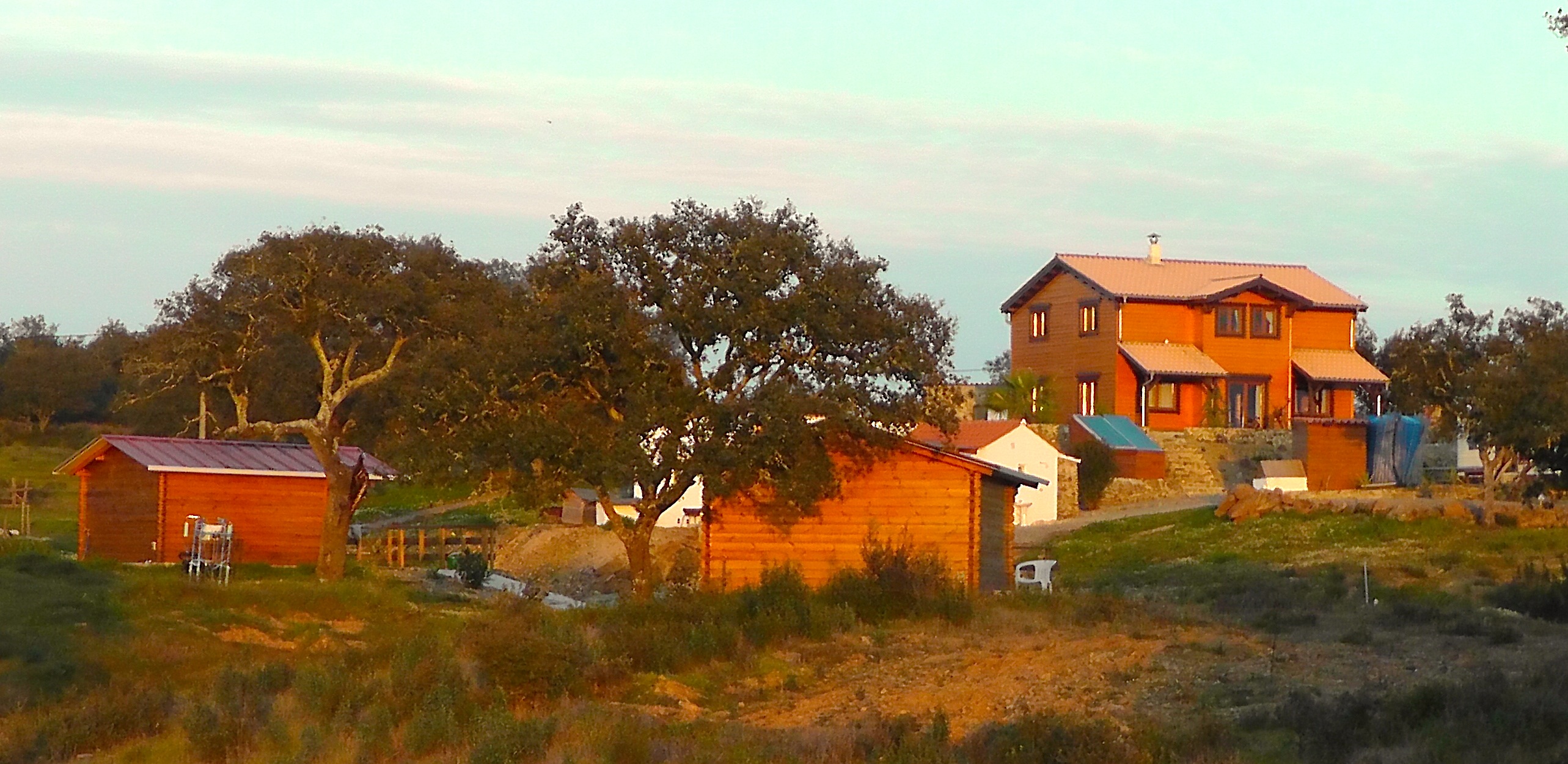 The farm Fronteiras covers an area of approx. 14 hectares and is situated in the hilly landscape of the Alentejo, in the south of Portugal. Seven kilometres away from the farm is a small village with around 450 inhabitants; the nearest town, Almodôvar, has around 3000 inhabitants and is 18 kilometres away.
The farm Fronteiras covers an area of approx. 14 hectares and is situated in the hilly landscape of the Alentejo, in the south of Portugal. Seven kilometres away from the farm is a small village with around 450 inhabitants; the nearest town, Almodôvar, has around 3000 inhabitants and is 18 kilometres away.
The farm's main building is a 160 m² wooden house with a large living room with conservatory, a large kitchen/diner, a pantry, a bathroom, four single rooms and a patio. The property also features seven small wooden houses, a laundry building, a workshop, an obstacle course, a sports and football pitch, a poultry coop, a goat shelter and two lakes. The farm has running water, electricity and heating.
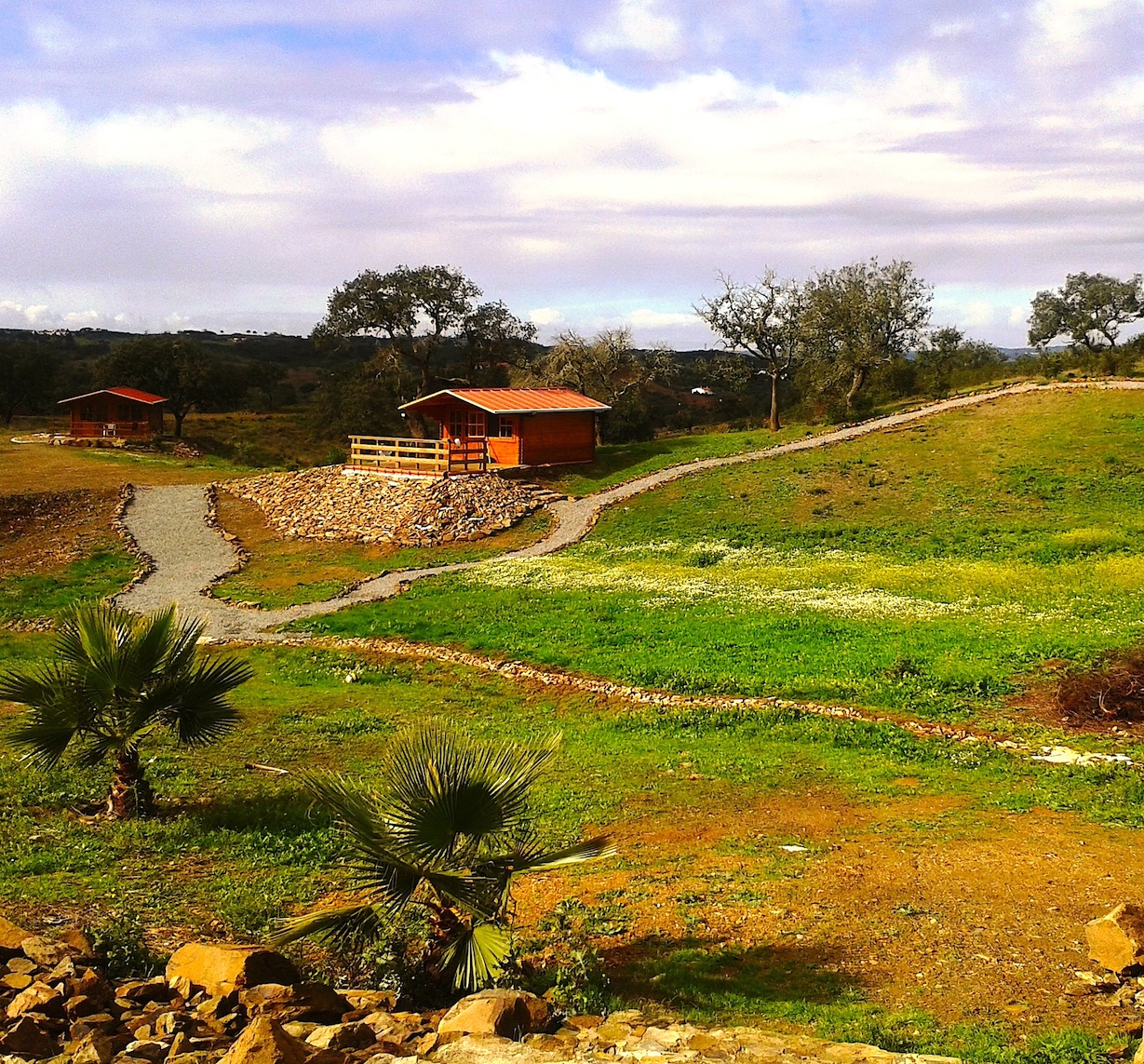 The nearby village of Gomes Aires has two cafés, a bakery, a municipal administration and cultural centre, a church, a football field, a nursery, a BBQ area with tables and an old well with places for doing laundry.
The nearby village of Gomes Aires has two cafés, a bakery, a municipal administration and cultural centre, a church, a football field, a nursery, a BBQ area with tables and an old well with places for doing laundry.
Its inhabitants enjoy a very simple lifestyle. Everyday life is far more relaxed here. It is almost as if time has stood still. The farmers who run the surrounding farms live almost exclusively from agriculture, animal husbandry and the sale or exchange of homemade produce such as sheep’s milk or goats' cheese, sausages and honey. The villagers work as mechanics, painters, bricklayers, shepherds, bakers, builders or carpenters.
Residential intensive pedagogical care home for children and young adults "Quinta do Cerro" (5 places)
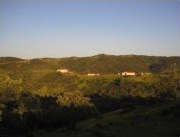 The farm "Quinta do Cerro" covers an area of approx. 87 hectares and is situated in a quiet rural location in the hills of the Alentejo. The nearest community is the village of Santa Cruz, which is five kilometres away. The county town of Almodôvar, with approx. 3000 inhabitants, is 20 km away.
The farm "Quinta do Cerro" covers an area of approx. 87 hectares and is situated in a quiet rural location in the hills of the Alentejo. The nearest community is the village of Santa Cruz, which is five kilometres away. The county town of Almodôvar, with approx. 3000 inhabitants, is 20 km away.
 The farm is accessed via a country lane that runs alongside the river "Vascão"; some sections of the river form the border between the Algarve and the Alentejo. The water supply for the showers, toilets, drinking water, kitchen etc. is drawn from the farm's own wells. There is running water. Electricity is produced on site with solar panels and a diesel-powered generator.
The farm is accessed via a country lane that runs alongside the river "Vascão"; some sections of the river form the border between the Algarve and the Alentejo. The water supply for the showers, toilets, drinking water, kitchen etc. is drawn from the farm's own wells. There is running water. Electricity is produced on site with solar panels and a diesel-powered generator.
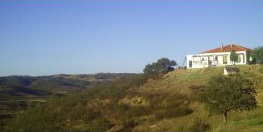 The residential unit is located on Quinta do Cerro. It has a large living room with a conservatory, a large kitchen/diner, one bathroom, five single bedrooms, a room/office for the youth workers and a patio. The property further includes two small wooden houses and two bungalows which also provide accommodation, a workshop, work rooms, horse stables and a paddock, a henhouse, a picnic spot directly by the river, and a small, man-made pond right next to the house. A fruit and vegetable garden offers a certain degree of self-sufficiency for eating a well-balanced diet.
The residential unit is located on Quinta do Cerro. It has a large living room with a conservatory, a large kitchen/diner, one bathroom, five single bedrooms, a room/office for the youth workers and a patio. The property further includes two small wooden houses and two bungalows which also provide accommodation, a workshop, work rooms, horse stables and a paddock, a henhouse, a picnic spot directly by the river, and a small, man-made pond right next to the house. A fruit and vegetable garden offers a certain degree of self-sufficiency for eating a well-balanced diet.
The Vascão river, which borders the land, offers opportunities for such outdoor activities as swimming, fishing or trips down the river on homemade rafts. The nearby village of Santa Cruz has approx. 100 inhabitants, a café, a bakery, a municipal administration and cultural centre, two churches (one of these dates from the 16th century), a BBQ area with tables and an old well with places for doing laundry. The square in front of the café is the centre of village life, and the residents gather there every day.
Residential intensive pedagogical care home for children and young adults "Nova Sembla" (5 places)
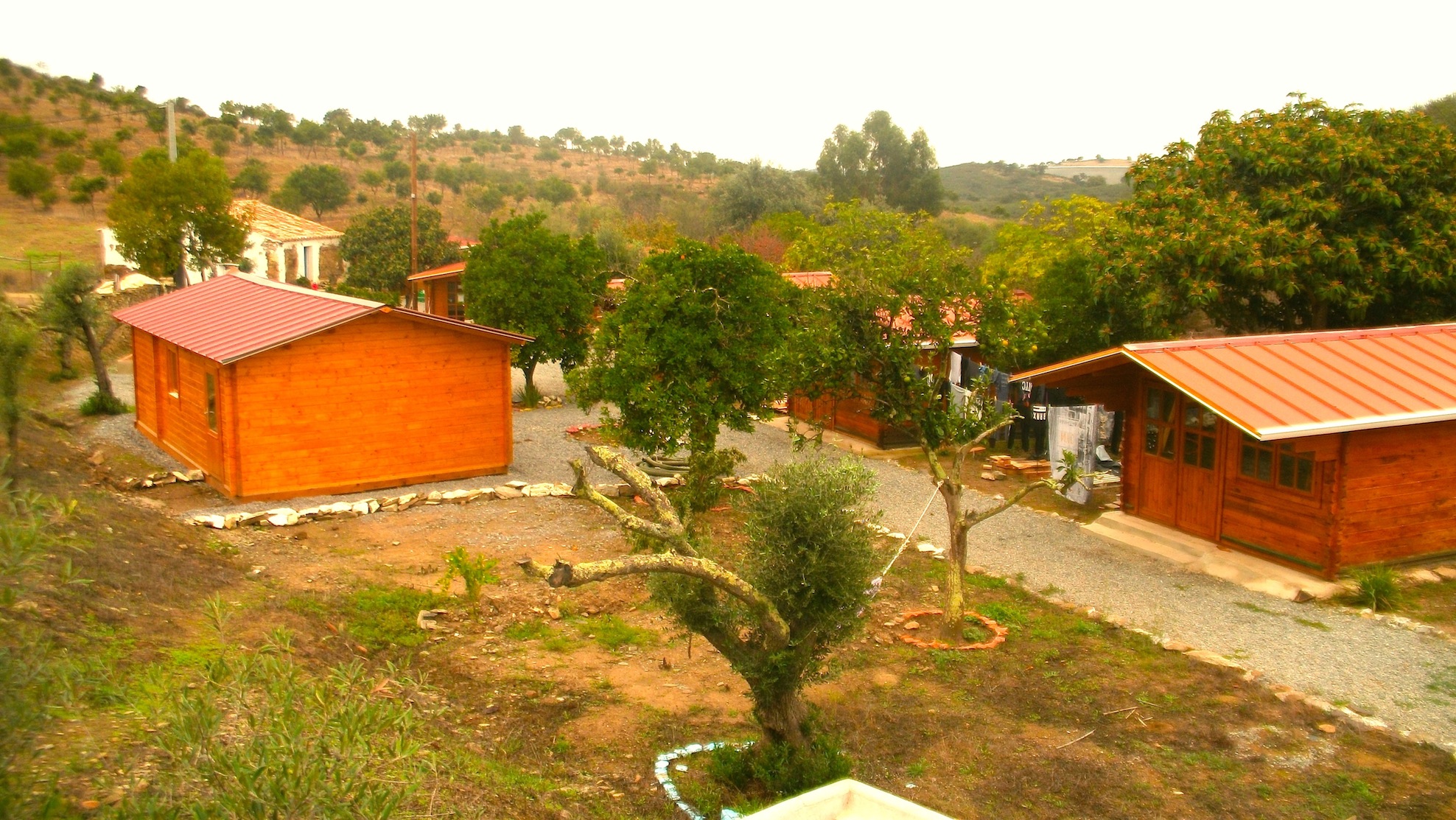
A small beck runs along the edge of the property. It supplies the land with sufficient water and is also a great place to cool off on hot days. There are numerous olive, orange, mandarin, nectarine, lemon, pomegranate and medlar trees. The property also has six wells, and features an old summer house, five small wooden houses that serve as accommodation, two wooden houses that provide accommodation for the youth workers, two toilet and shower buildings, a wooden house that is home to the kitchen, and a large wooden building which provides accommodation and is also used as a common room/living room. "Nova Sembla" has running water, electricity and heating.
The nearest village, Semblana, has around 300 inhabitants and offers an old bakery, two small grocery stores, two cafés/restaurants, an ATM, a municipal administration and cultural centre, a health centre, an old church and public toilets and showers. The inhabitants live almost exclusively off the land; they also make honey or work in the nearby copper mine "Neves Corvo".
One-to-one support
Individual pedagogical one-to-one support, for example within a family, is intended for younger children for whom a group project is less suitable in the long term, and also for young people who are less than sixteen years old and have successfully completed Stages 1 and 2 but cannot be considered for any kind of supported housing yet and can also not return to their own family and home country.
Progresso cooperates with various different foster families in quiet, rural areas in the Algarve and in the Alentejo. In these instances, the child or young adults placed there live under the same roof as their youth workers, who may sometimes also have their own children living with them.
In this safe and secure atmosphere, the child or young adult is offered the chance to form stable relationships with others and the chance to enjoy a clearly structured day-to-day life. All chores are dealt with together, for instance decorating and redesigning the house, or the farm work.
As in the shared accommodation in the residential care units, the children and young adults are educated either by taking part in a distance learning programme or by visiting the local international or German-language school, which ensures that the transition back to school when they return to their home country runs smoothly.
Supported housing is aimed at young adults aged sixteen and above who have reached a discernible degree of maturity which indicates that they may be capable of leading an independent life but are as yet still in need of support.
The aim of supported housing is that these young people will be capable of a fully independent life once they have completed the measure.
This transition towards independence takes place in two steps; initially in supported housing shared with other young people (transitional home), afterwards in their own apartments; both forms always with an individually tailored extent of support.
The team members help the young adults on their path to maximum independence on the basis of a joint, individually developed time and goal schedule. In this way, the young adults gradually become able to manage and take charge of their day-to-day life themselves. If a young adult undergoing Stage 2 has not left secondary school with some kind of certificate, they can still gain a certificate during Stage 3. If school is no longer an option, or they have already successfully gained a secondary school certificate, the young adult is expected to find a job or to start an apprenticeship, and must apply for these. However, they must adhere to certain "working world structures" (get up promptly and independently, get to work on time etc.). By allowing young adults to manage their own budget, they are gradually taking on more responsibility, e.g. by paying for the weekly shopping, their own household, rent, electricity, water or insurance. The young adults must also take up a hobby in order to learn how to plan and organise their spare time.
The general overall objectives of supported housing are:
- to enable young adults to live an independent life, and to encourage them to recognise their own resources
- to cope with everyday life in the form of budget planning and adhering to daily routines
- to learn how to deal with practical matters (official paperwork etc.)
- to cope with crises and conflicts by developing or improving their social skills (conflict management strategies, the ability to deal with conflicts, to maintain relationships etc.)
- to develop their own personality and to teach them how to act independently and responsibly
- to experience and learn self-confidence
- to learn to be on their own
- to develop their body awareness further (hygiene, health, healthy diet)
- budget management
- regulation of the relationship with their family (detachment/establishing and maintaining contact)
- establishment of life and future prospects (completion of vocational training or apprenticeship, internships, how to write an application etc.)
- meaningful leisure time activities
[ up ]